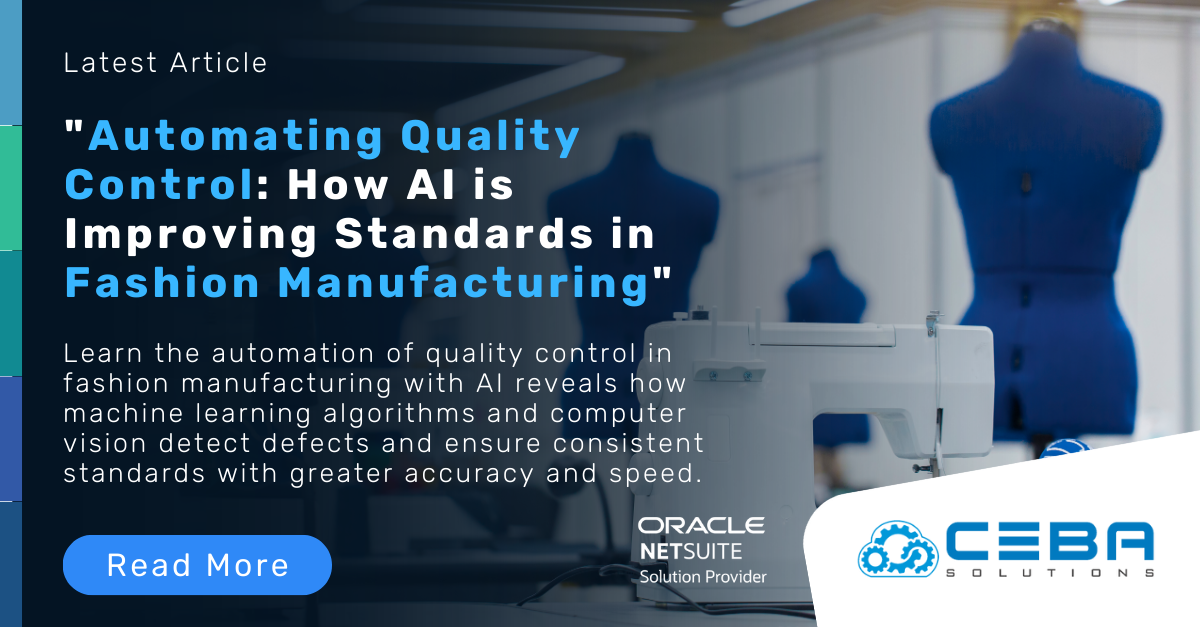
Smart Manufacturing: The Impact of AI on Apparel Production Processes
Smart Manufacturing: The Impact of AI on Apparel Production Processes
Artificial Intelligence (AI) is significantly transforming the landscape of apparel manufacturing, marking the onset of the smart manufacturing era. This technological revolution is optimizing production processes, enhancing quality control, and ensuring greater sustainability. This article explores the profound impacts of AI on the apparel industry, focusing on how it streamlines operations, reduces waste, and boosts productivity.
1. Automated Design and Pattern Making
AI technologies are reshaping the initial stages of apparel production, such as design and pattern making. AI-driven software can analyze trends and consumer preferences to suggest designs that are likely to be successful. Additionally, AI can automate the pattern-making process, ensuring precision and reducing the time from design to production.
Benefits:
- Increased Efficiency: Speeds up the design phase and allows for rapid prototyping. AI can handle repetitive tasks such as pattern adjustments, freeing designers to focus on creativity and innovation.
- Enhanced Creativity: AI can generate numerous design variations, providing designers with creative insights that were not previously considered. This broadens the scope of possibilities and inspires new design ideas.
Real-World Application:
Brands like Tommy Hilfiger have embraced AI-driven design tools to streamline their creative processes. By leveraging AI, they can quickly generate multiple design prototypes and refine them based on data-driven insights, significantly reducing the time to market.
2. Precision Cutting and Reduced Fabric Waste
AI integrates seamlessly with cutting-edge cutting machinery to optimize fabric usage, significantly reducing waste. By precisely calculating the most efficient way to cut patterns, AI minimizes excess fabric, which not only reduces costs but also aligns with sustainability efforts in the fashion industry.
Benefits:
- Cost Reduction: Lower material costs due to reduced fabric waste. Precision cutting technologies ensure that every piece of fabric is utilized to its maximum potential.
- Environmental Impact: Supports sustainability by decreasing the amount of waste sent to landfills. Efficient use of resources aligns with the industry's move towards more sustainable practices.
Real-World Application:
Levi Strauss & Co. has implemented AI-powered cutting machines that optimize fabric usage. This technology has helped the company reduce material waste by up to 15%, contributing to their sustainability goals and cost-saving measures.
3. Quality Control Automation
AI-powered vision systems are employed in quality control processes to identify defects in materials or inconsistencies in stitching. These systems can scan garments at high speeds with high accuracy, far surpassing the capabilities of human inspectors.
Benefits:
- Improved Product Quality: Consistent and objective quality assurance ensures that all products meet the required standards. AI systems can detect minute defects that might be overlooked by human inspectors.
- Reduced Rework: Early detection of defects decreases the need for corrections at later stages of production. This not only saves time but also reduces the costs associated with reworking defective products.
Real-World Application:
Hugo Boss uses AI-driven quality control systems to ensure their products meet stringent quality standards. These systems scan each garment for defects, ensuring that only top-quality products reach the consumers.
4. Supply Chain Optimization
AI enhances decision-making in supply chain management by providing predictive insights on inventory levels, production bottlenecks, and demand forecasting. This ability allows manufacturers to adjust their production schedules and inventory in real-time, reducing overproduction and stockouts.
Benefits:
- Increased Flexibility: Rapid response to changing market demands and supply chain disruptions. AI can help manufacturers pivot quickly to address sudden changes in demand or supply chain issues.
- Optimized Inventory Levels: Maintains an ideal balance of inventory, reducing both overstock and stock shortages. Accurate demand forecasting helps ensure that production aligns closely with market needs.
Real-World Application:
Zara, a leader in fast fashion, uses AI to optimize its supply chain. By integrating AI for demand forecasting and inventory management, Zara can rapidly adapt to market trends, ensuring that their stores are stocked with the latest fashions.
5. Energy and Resource Management
Smart manufacturing also involves the use of AI to manage energy consumption and other resources more efficiently. AI systems can monitor energy usage across various production stages and optimize operations to reduce overall energy consumption.
Benefits:
- Cost Savings: Reduced energy costs contribute directly to lower production costs. Efficient energy management can significantly cut operational expenses.
- Sustainability: Lower energy usage decreases the carbon footprint of manufacturing operations. This is crucial for brands looking to enhance their sustainability credentials.
Real-World Application:
Patagonia has implemented AI-driven energy management systems in their manufacturing processes. These systems monitor and optimize energy use, reducing the company’s overall energy consumption and supporting their commitment to environmental sustainability.
Conclusion
AI is revolutionizing the apparel manufacturing process, making it smarter, more efficient, and more sustainable. The adoption of AI technologies not only boosts productivity and reduces costs but also significantly enhances the quality and sustainability of apparel products. As AI continues to evolve, its integration into apparel manufacturing will likely deepen, further transforming the industry and setting new standards in smart manufacturing.
In an increasingly competitive and environmentally conscious market, the benefits of AI in apparel production are clear. By embracing these advanced technologies, manufacturers can improve operational efficiency, reduce waste, and produce higher-quality products. The future of apparel manufacturing is undoubtedly smart, and AI is at the heart of this transformation, driving innovation and sustainability in the industry.






